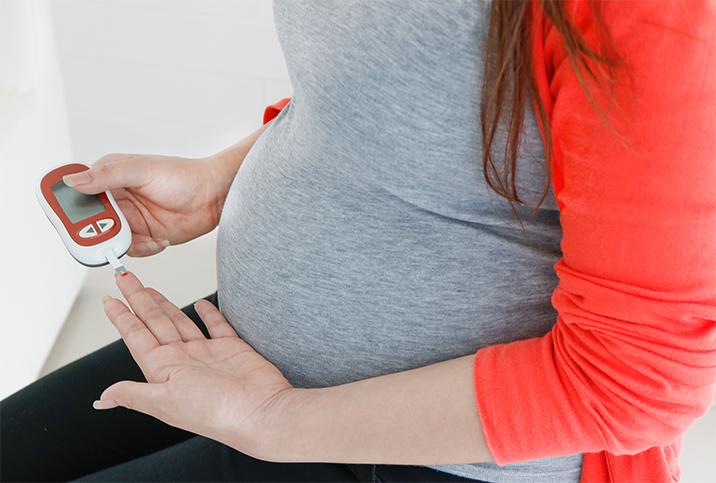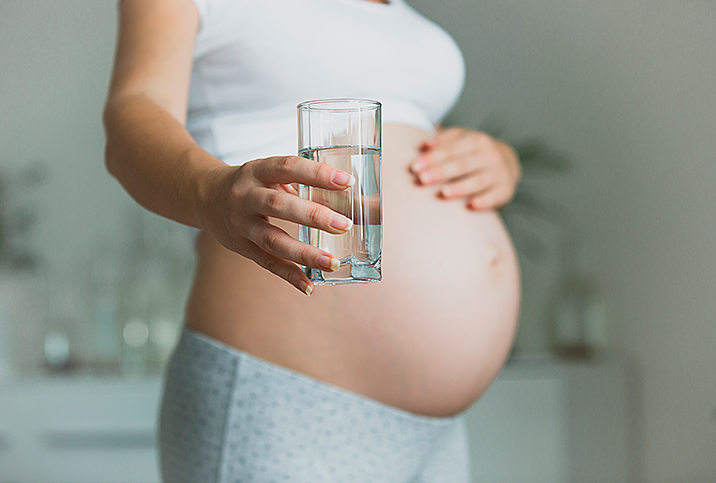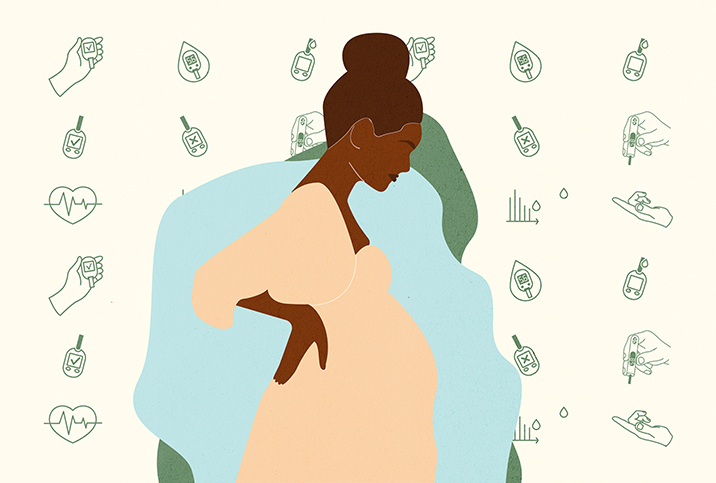Could Your Screen Time Be Putting You and Your Baby's Health at Risk?

If you can’t step away from cat memes, parenting advice forums or doom-and-gloom news websites until long past bedtime, that blue light exposure could increase your risk for certain pregnancy-related health conditions, such as gestational diabetes (GD).
How can sleep habits affect a pregnant woman?
Poor maternal sleep habits can affect the health of mother and baby. According to a 2022 study, unhealthy nighttime habits such as exposure to artificial light and inadequate nocturnal eating were associated with low-quality sleep among pregnant women.
"In our bodies, there is a strong association between our circadian rhythm and blood sugar regulation," said Salome Masghati, M.D., OB-GYN, based in Largo, Florida. Falling asleep over your phone or tablet isn’t helping your body.
"Lack of sleep is an inflammatory condition for the body and is associated with increased blood sugar levels, weight gain and a higher risk for metabolic syndrome," said Valerie Cacho, M.D., an integrative sleep physician and women's sleep expert, based in Fullerton, California.
Artificial light, quality of sleep and your health
Light from electronic devices and artificial light can factor into sleep disorders such as insomnia, which can lead to a number of health problems that put your physical well-being at risk.
For example, late-night light has a melatonin-suppressing effect that can potentially affect thermoregulation, glucose homeostasis and blood pressure.
Studies suggest that nighttime light can increase obesity risk in women. Meanwhile, exposure to blue light from digital devices before bedtime in pregnant women can spike blood glucose levels.
A 2022 study associated this type of light exposure to maternal fasting glucose and infant birth weight.
"Those spikes can increase the risk for gestational diabetes, which is a condition of impaired glucose metabolism and decreased insulin sensitivity during pregnancy," Masghati said.
What is gestational diabetes?
In 2020, gestational diabetes mellitus affected 7.8 percent of all pregnancies in the United States, according to a report from the Centers for Disease Control and Prevention. The new data illustrated a 30 percent increase from 2016.
Gestational diabetes can potentially increase obstetric complications such as preeclampsia, gestational hypertension and cesarean delivery. Additionally, women with gestational diabetes are at higher risk of developing type 2 diabetes.
What increases the risk of gestational diabetes?
Spending three hours before bedtime in front of a cellphone screen can up the risk factors of developing gestational diabetes, suggested a 2023 Northwestern University study.
"We don't think about the potential harm of keeping the environment bright from the moment we wake up until we go to bed," said lead study author Minjee Kim, M.D., assistant professor of neurology at Northwestern University Feinberg School of Medicine, in a statement.
The researchers observed 741 women at clinical centers in the United States. The light exposure was calculated with an actigraph on the wrist of the pregnant woman, which measured the sleep cycle. The study adjusted for variables such as weight and age and indicated a link between light exposure and GD.
"Try to reduce whatever light is in your environment in those three hours before you go to bed," Kim said. "It's best not to use your computer or phone during this period. But if you have to use them, keep the screens as dim as possible."
How can I reduce the risk of gestational diabetes?
"Light exposure prior to bedtime can lead to the delay of the release of melatonin, a natural hormone released by your brain in response to darkness. This can make you sleepier later and impact the quality of sleep you have," Cacho said. It can affect your overall quality of life in the process.
"Blue light exposure after sunset, for example, cellphones, computer screens, fluorescent lighting, LED lights, etc., can impact our melatonin and cortisol secretion and mess up our glucose metabolism and insulin sensitivity," Masghati said.
Artificial light before bedtime can spike glucose levels and affect cardiometabolic function, yet it's not just the light inside your bedroom that's to blame. Outdoor light pollution can disrupt circadian rhythms, disrupt metabolism and increase the risk of diabetes, according to different studies.
"Some research has shown that even turning our screens to the night mode can still emit too much light. Better to avoid screens an hour prior to your bedtime,” Cacho said.
What are the effects of sleep deprivation?
"Without an adequate amount of sleep, the organs of the body continue to work instead of rest," Cacho said. "This is especially true for the heart and the brain where sleep deprivation is associated with increased heart conditions and problems with cognitive function."
Some of the problems associated with long-term sleep deprivation include:
- Metabolic disorders
- Common cold
- Cardiac arrhythmias
- Increased risk of developing asthma
- Mental health problems
- High cholesterol
- Hypertension
- Coronary heart disease
How can I improve my sleep quality during pregnancy?
"Make sleep a priority and build good sleep habits as much as possible prior to the arrival of your baby," Cacho said. "We can be tempted to stay up late researching the latest baby gear or picking out décor for the nursery. You’re better off turning off your phone and sleeping."
Masghati made a quick list of suggestions to help potentially improve your sleep:
- Wear blue light-blocking prescription lenses.
- Dim your lights at home after sunset.
- Use blue light-blocking red light bulbs or salt lamps.
- Stop using electronic devices 1-2 hours before sleep.
- Switch to a book or an audio podcast instead of looking at a screen.
"Avoiding late-night snacking is important as well, as it can lead to heartburn at night," Cacho added. "Also, limit your fluid intake to reduce extra visits to the restroom at night. Depending on how far along you are, this may be unavoidable."
Another way to offset the negative effects of blue light at night, according to Masghati, is early exposure to natural sunlight, as exposure to sunlight in the morning can improve insulin resistance and could help reduce the risk of diabetes in some people.
The bottom line
Gestational diabetes is a temporary condition. To help potentially reduce the risk of developing GD, studies suggest you may want to limit your pre-bed exposure to blue light. Speak with your doctor if you have any questions to help ensure a healthy baby.


















